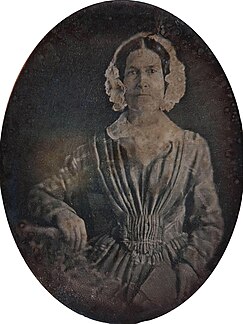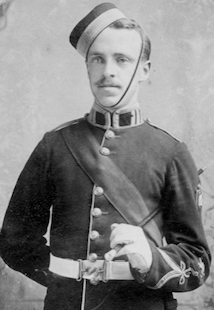 W
WMary Elizabeth "Betty" Taylor Bliss Dandridge, born Mary Elizabeth Taylor, was the youngest of the three surviving daughters of President Zachary Taylor (1849–1850) and Margaret Mackall Smith Taylor.
 W
WWilliam Wallace Smith Bliss was a United States Army officer and mathematics professor. A gifted mathematician, he taught at West Point and also served as a line officer.
 W
WWilliam Brewster was an English official and Mayflower passenger in 1620. In Plymouth Colony, by virtue of his education and existing stature with those immigrating from the Netherlands, Brewster, a Brownist, became senior elder and the leader of the community.
 W
WChaswood is a rural community in the Musquodoboit Valley northwest of Middle Musquodoboit, Nova Scotia in Nova Scotia, Canada. Chaswood is named in honour of Charles Carroll Wood.
 W
WJefferson Finis Davis was an American politician who served as the president of the Confederate States from 1861 to 1865. As a member of the Democratic Party, he represented Mississippi in the United States Senate and the House of Representatives before the American Civil War. He previously served as the United States Secretary of War from 1853 to 1857 under President Franklin Pierce.
 W
WByrd "Birdie" Spilman Dewey was an American author, land investor, and co-founder of the Town of Boynton. She lived in Florida from 1881 until her death in 1942. Her best known work, Bruno, told the Dewey's story of early pioneering days in central Florida. The book remained in print for over twenty years, classified as juvenile literature – today it is classified as young adult literature.
 W
WHazelwood is a historic archaeological site located at Port Royal, Caroline County, Virginia. It was the site of the historic house and plantation "Hazelwood", home of political economist and U.S. Senator John Taylor of Caroline (1753-1824). The house was built about 1750 and destroyed during the American Civil War.
 W
WJohn Taylor, usually called John Taylor of Caroline, was a politician and writer. He served in the Virginia House of Delegates and in the United States Senate. He wrote several books on politics and agriculture. He was a Jeffersonian Republican and his works provided inspiration to the later states' rights and libertarian movements. Sheldon and Hill (2008) locate Taylor at the intersection of republicanism and classical liberalism. They see his position as a "combination of a concern with Lockean natural rights, freedom, and limited government along with a classical interest in strong citizen participation in rule to prevent concentrated power and wealth, political corruption, and financial manipulation" (p. 224).Wealth, like suffrage, must be considerably distributed, to sustain a democratic republic; and hence, whatever draws a considerable proportion of either into a few hands, will destroy it. As power follows wealth, the majority must have wealth or lose power.
 W
WRichard Lee I, later nicknamed "The Immigrant" was the first member of the Lee family to live in America; he emigrated from Shropshire, England to Virginia in 1639. Lee was a lawyer, planter, soldier, politician, and Member of the Virginia House of Burgesses.
 W
WJames Madison was an American statesman, diplomat, expansionist, philosopher, and Founding Father who served as the fourth president of the United States from 1809 to 1817. He is hailed as the "Father of the Constitution" for his pivotal role in drafting and promoting the Constitution of the United States and the United States Bill of Rights. He co-wrote The Federalist Papers, co-founded the Democratic-Republican Party, and served as the fifth United States Secretary of State from 1801 to 1809.
 W
WMargaret "Peggy" Mackall Taylor was the wife of Zachary Taylor. She was the First Lady of the United States from 1849 to 1850.
 W
WRichard "Dick" Taylor was an American planter, politician, military historian, and Confederate general. Following the outbreak of the American Civil War, Taylor joined the Confederate States Army, serving first as a brigade commander in Virginia, and later as an army commander in the Trans-Mississippi Theater. Taylor commanded the District of West Louisiana and was responsible for successfully opposing United States troops invading upper northwest Louisiana during the Red River Campaign of 1864. He was the only son of Zachary Taylor, the 12th president of the United States.
 W
WSarah Knox "Knoxie" Taylor Davis was the daughter of the 12th U.S. President Zachary Taylor and part of the notable Lee Family. She met Jefferson Davis (1808–1889), when living with her father and family at Fort Crawford during the Black Hawk War in 1832. They married in 1835 and she died three months later of malaria.
 W
WJonathan Edwards Spilman was a Kentucky lawyer, minister, and composer.
 W
WThe Zachary Taylor House, also known as Springfield, was the boyhood home of the twelfth President of the United States, Zachary Taylor. Located in what is now a residential area of Louisville, Kentucky, Taylor lived there from 1795 to 1808, held his marriage there in 1810, and returned there periodically the rest of his life.
 W
WLieutenant Charles Carroll Wood was the first Canadian Officer to die in the Second Boer War. As a member of a family that had distinguished itself in America, his great grandfather being Zachary Taylor, 12th President of the United States, he was buried with full military honours.
 W
WJohn Taylor Wood was an officer in the United States Navy and the Confederate Navy. He resigned from the U.S. Navy at the beginning of the American Civil War, and became a "leading Confederate naval hero" as a captain in the Confederate Navy. He was a lieutenant serving aboard CSS Virginia when it engaged USS Monitor in 1862, one of the most famous naval battles in Civil War and U.S. Naval history. He was caught in 1865 in Georgia with Confederate President Jefferson Davis' party, but escaped and made his way to Cuba. From there, he got to Halifax, Nova Scotia, where he settled and became a merchant. His wife and children joined him there, and more children were born in Canada, which is where he lived out the remainder of his life.
 W
WZachary Taylor was the 12th president of the United States, serving from March 1849 until his death in July 1850. Taylor previously was a career officer in the United States Army, rose to the rank of major general and became a national hero as a result of his victories in the Mexican–American War. As a result, he won election to the White House despite his vague political beliefs. His top priority as president was preserving the Union. He died sixteen months into his term. He made no progress on the most divisive issue in Congress, slavery.